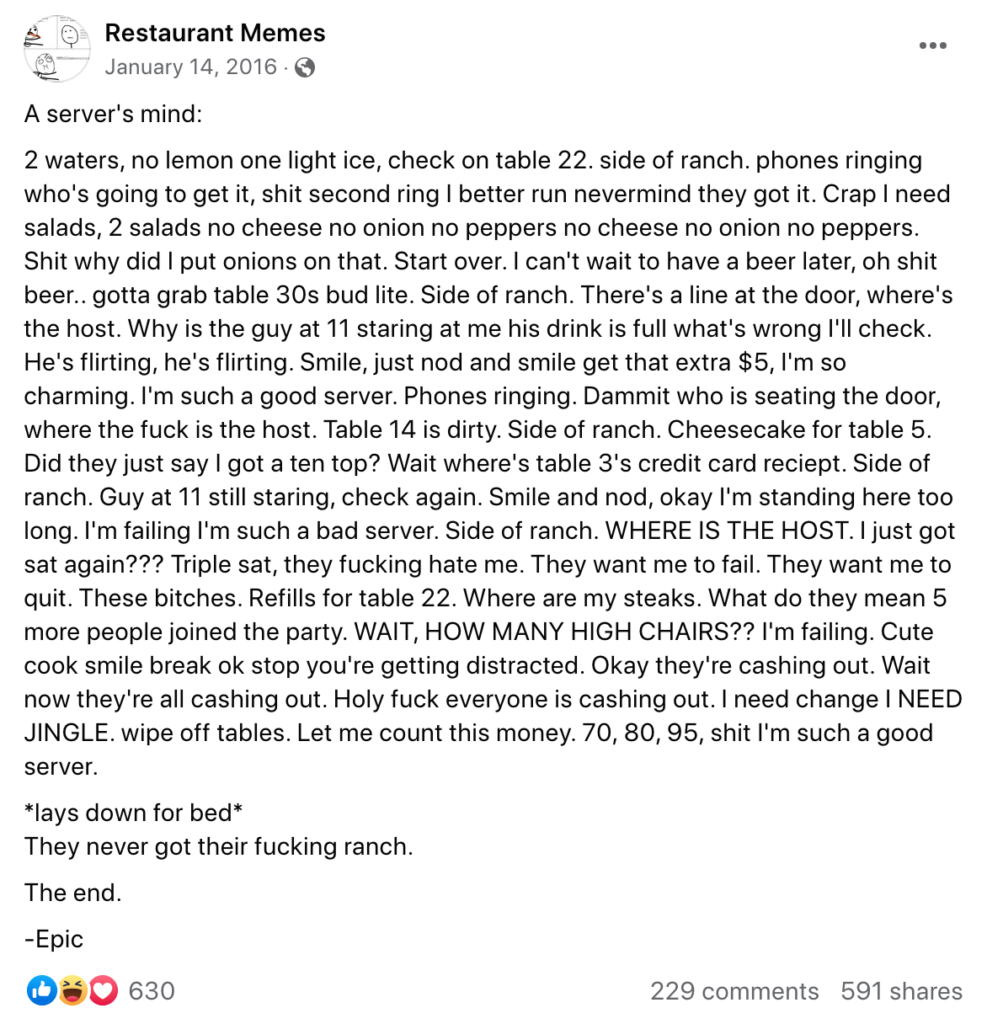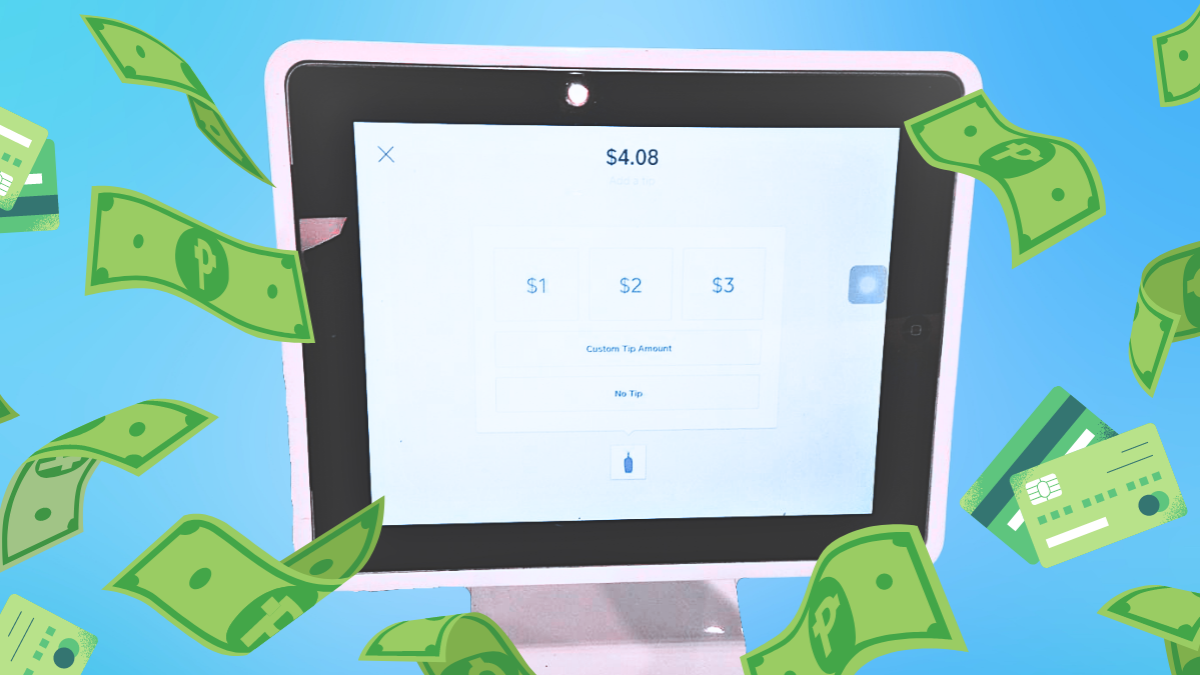I’ve never felt more seen than when I stumbled upon this glorious waitressing meme. It happened during my annual summer masochism of serving *chef’s kiss* Italian food to friendly Wisconsin locals plus a great many snowbird wine moms who’d return to the lakes and surrounding restaurants for as much of the Midwest as they could handle: June, July, and August.
Here it is:

As the saying goes, it’s funny because it’s true. Fanning through a fat wad of cash money at the end of a double shift brings a smile to a server’s face precisely because it’s the sweet, green reward for a blistery 20,000 steps, a rumbling in the belly (Does one faceful of linguine and a swig of Diet Coke at 3 p.m. count as a meal?), an awkward amount of sweat in all the wrong places, and enough social engagement to make even the chattiest of extroverts want to crawl in a hole.
Servers do all this with the guarantee of only a few bucks — a $3.00-ish hourly rate doesn’t cut it — but the expectation of many more. That’s all part of the appeal — and risk — of waitressing. You bust your hump for tables and tips because you know if you’re speedy, accurate, and charming, all the hustle will be worthwhile.
So what’s this nonsense about customers being asked to tip at self-checkouts?
You read that right. Biden’s economy is so bad that businesses from airports to cookie shops to mega coffee chains to stadiums are asking customers to tip at self-checkouts, presumably to help bolster employee wages even if patrons aren’t interacting with those employees at all. Unlike an actual server, faceless machines never go the extra mile, but they do sometimes malfunction and slow customers down or charge them too much for a sale item.
It gets worse when you consider that businesses install self-checkout machines in part to save themselves the money they would otherwise have to pay an actual person to operate a register. Yet these greedy gutses have the gall to ask you for an extra few Washingtons — or even a full 15, 18, 20 percent, or more — for you to ring up your own purchase. Excuse me, airport snack shack, but you should be paying me for self-checking a $6 bottle of water.
As one airport customer who purchased such overpriced H2O correctly concluded, it’s “emotional blackmail.”
My Bad
The harsh reality of the situation is it’s our own dang fault we’re being pressured to tip a robot for work we’re doing ourselves. After all, takeout and coffee shop extortionists have been squeezing every last buck out of us with their fancy iPads now for years, and we’ve let them.
Surrounded by a line of strangers — who may or may not even be paying attention — and a barista who pretends to look away when we swipe our cards, we jab the $2 tip button for a $4 iced coffee. Emotional blackmail, indeed.
Some of us have conditioned ourselves to tip even when we know nobody is watching. If you’ve ever used the mobile app for Chipotle or Starbucks, for instance, you’ve been prompted to “tip the crew.” In other words, you search a menu from your screen, place your own order, pay for it, drive yourself to the establishment, and grab your food or drink from a to-go counter without any human interaction, all while corporate giants sit there with their hands out Mona-Lisa Saperstein-style whining “Money pleeeeeease!”
The whole tipping ritual has spiraled quite out of control. A tasty sushi spot in Madison, Wisconsin, called Jacknife has got the whole modern takeout experience down to a science — literally. You use your phone number to sign into the business’s website, place your order online, get assigned an order number, and fetch it yourself from what amounts to an Amazon pickup locker — no human face time required.
In addition to slapping on a service charge, the restaurant’s website defaults to adding a tip, with preset options that go all the way up to 25 percent. But here’s the real kicker: Robots even make the sushi.
Stop the Madness
For all the reasons mentioned in the meme and more, do not stop tipping your waiters. Don’t stop tipping your barbers or beauticians, either. These are people with real skills who spend time interacting with and performing services for you that you can’t or don’t want to do for yourself. Their livelihoods depend on tips. If a particularly chipper barista pours an exquisite swan into your latte’s microfoam, sure, toss him a dollar if you feel so inclined. #SupportLocalArtists.
But for the love of all that is holy, stop tipping 20 percent for an iced latte or robot sushi or a fast-food burrito. In case you need the reminder, you’re already paying these people for the low-skill goods they provide. That isn’t an insult; it’s just a fact: The cost of employing that tortilla roller is already baked into the price.
Our economy runs on fast food just as much as sit-down-restaurant food, but not all service is created equal. In some of these digital transactions — especially self-checkouts — real service doesn’t exist at all.
In any case, do not allow yourself to be blackmailed. If the iPad at your favorite takeout spot makes you feel like a terrible person, it might be time to find a new favorite takeout spot, and it’s definitely time to recalibrate your “human decency” barometer. Since when do entitled businesses doing the bare minimum get to decide what’s “nice”?
Tipping harassment is an awful lot like Covid mask-wearing or pronoun advertising in an email signature — not because it’s a political issue, but because the overwhelming societal pressure to perform a certain way magically dissipates every time you refuse to participate. No, you aren’t super-spreading by breathing freely. No, including your obvious pronouns in your sign-off doesn’t make you more virtuous. And no, tipping isn’t — or shouldn’t be — an expectation for someone merely doing his menial job.
So just say no. The only way to stop the psychological warfare of ubiquitous tipping prompts is by clicking the “No Tip” button with confidence.









